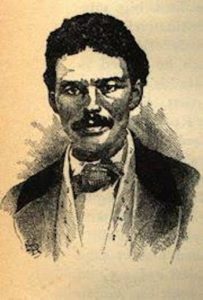
John Anthony Copeland
*John Anthony Copeland was born on this date in 1834. He was a free Black carpenter and abolitionist.
John Anthony Copeland Jr. was born in Raleigh, North Carolina; his parents were John Anthony Copeland, a slave, and Delilah Evans, born a free Black. Copeland Sr. was emancipated as a boy in about 1815. As a young man, he married Evans, and they lived near Hillsborough, North Carolina, until 1843, when the family fled racial persecution, first to Cincinnati, Ohio, and then to Oberlin. Some of his wife's brothers and their families also settled there.
The Copelands lived on the southeast corner of Professor and Morgan Streets. He became a carpenter and briefly attended the preparatory division of Oberlin College. As a young man, he became involved in the Oberlin Anti-Slavery Society. Together with his maternal uncles, Henry and Wilson Bruce Evans, in September 1858, Copeland was a leader of the thirty-seven men involved in the incident known as the Oberlin-Wellington Rescue, freeing John Price, a runaway slave who had been captured and held by authorities under the 1850 Fugitive Slave Act.
The men freed the slave and helped him escape to Canada. Copeland was indicted but escaped arrest and was himself a fugitive. In September 1859, Copeland was recruited to participate in John Brown's failed raid on Harpers Ferry by his uncle and fellow raider, Lewis Sheridan Leary. He was captured while swimming across the Shenandoah River. Copeland, Brown, and five others were held for trial by the state of Virginia. He was also visited by marshals seeking him for the Wellington rescue indictment.
At the trial, Copeland was found guilty of murder and conspiracy to incite slaves to rebellion and sentenced to death by hanging. A charge of treason was dropped, as his attorney, George Sennott, citing the Dred Scott decision, successfully argued that since Copeland was not a citizen under that Supreme Court ruling, he could not commit treason. Copeland was executed at Charles Town, Virginia, on December 16, 1859. On his way to the gallows, he reportedly said, "If I am dying for freedom, I could not die for a better cause. I had rather die than be a slave."